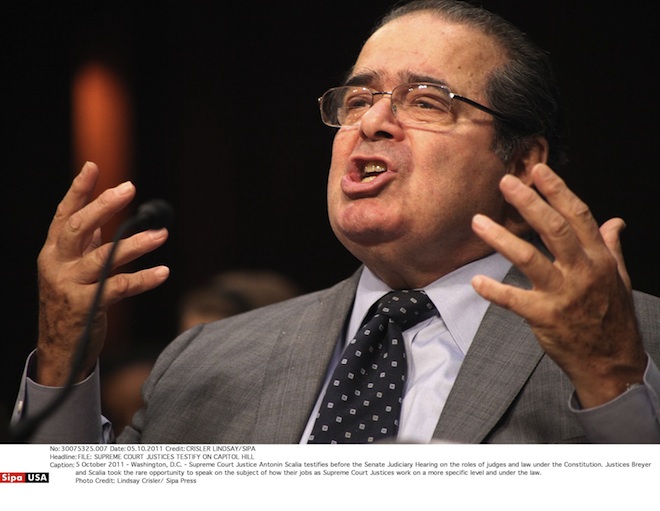This article was updated at 1:00 pm ET to include breaking news after publication.
The Obama administration is already facing lawsuits challenging its requirement that insurance plans cover birth control as a violation of religious freedom. Speaker John Boehner (R-OH) has flatly called the regulation unconstitutional. But although it’s unclear how much traction the legal challenges will gain, especially in light of the White House adjusting the mandate Friday, the President and his backers have one unlikely man to thank for helping their cause: Justice Antonin Scalia.
“One thing I think is crystal clear — there is no First Amendment violation by this law,” Adam Winkler, a constitutional law professor at UCLA, told TPM. “The Supreme Court was very clear in a case called Employment Division v. Smith, written by none other than Antonin Scalia, that religious believers and institutions are not entitled to an exemption from generally applicable laws.”
The Reagan-appointed conservative justice authored the majority opinion in the 1990 decision Employment Division v. Smith, a critical precedent to the birth control case, decreeing that religious liberty is insufficient grounds for being exempt from laws. The Supreme Court said Oregon may deny unemployment benefits to people who were fired for consuming peyote as part of a religious tradition, seeing as the drug was illegal in the state.
“To permit this would be to make the professed doctrines of religious belief superior to the law of the land, and in effect to permit every citizen to become a law unto himself,” wrote Scalia, an avowed Catholic and social conservative, quoting from a century-old Supreme Court decision and giving it new life. His opinion was cosigned by four other justices.
Thanks to this decision more than any other, Winkler said there’s no reason to believe the constitutional argument against the rule has any legs. And while the high court later ruled to create a ministerial exception in anti-discrimination laws (to shield the Church from liability in forbidding women to become priests), it has not altered the Smith precedent insofar as it applies to the birth control rule. “So it would seem extremely difficult” for the courts to overturn it on that basis, Winkler posited. “I don’t think there’s any real argument.”
Critics have posited that the application of drugs in Smith was a motivating factor in the decisions of Scalia and the other conservative justices. “Sure, I think there’s something to that argument,” Winkler said. But ‘stare decisis’ (court-speak for judicial precedent) applies all the same. And it wouldn’t even be the first time Scalia has handed down a decision that the Obama White House can use against conservatives.
Sadly for liberals, though, the legal basis for a challenge doesn’t end there. Apart from the First Amendment option, there’s another, more substantial judicial route that opponents of the birth control rule can take. After Smith was handed down, Congress passed a law to push back on the ruling, which Winkler said “attempts to provide more protection for religion than the Supreme Court was willing to give.”
The 1993 Religious Freedom Restoration Act said any law that burdens religious freedom must satisfy strict scrutiny. The Supreme Court later said it cannot apply to states (which is why the 28 states that already have the birth control rule the White House wants to take nationwide are in the clear), but held that those requirements shall apply to federal laws. First, the law may not be a “substantial burden” and can only be an “incidental burden” on religious practices; second, it must be justified by “compelling government interest”; third, it must be narrowly tailored to pursue that interest.
Although it was an open question whether the original birth control requirement would pass this level of scrutiny, the White House’s announcement Friday allowing religious nonprofits to opt out (in which case the insurer would be forced to pay for birth control without a copay) appears to restrict the RFRA argument to overturn it.
“This neuters the RFRA arguments entirely, it seems to me,” Winkler told TPM after the announcement. “Now that religious institutions are no longer required to [pay for employees’ birth control coverage], it’s hard to make the argument that the contraception mandate substantially burden religious beliefs.”
Conservatives are less than satisfied with the White House accommodation and it’s unclear how the entities suing over the birth control requirement will react. But either way, one of their two possible routes to pushing back has had a huge impediment thrown in its path by none other than Antonin Scalia.










